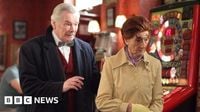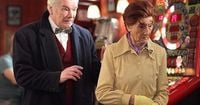Frank Barrie, a distinguished actor celebrated for his extensive theatre career and memorable role in the BBC soap opera EastEnders, has passed away at the age of 88. The news was confirmed by his agency, Scott Marshall Partners, who announced that Barrie died peacefully at home on June 30, 2025, surrounded by his wife Mary and daughter Julia.
Born in Scarborough and raised in York, Barrie's journey into acting began early. He attended Archbishop Holgate's School in York before studying at the University of Hull, where he met his wife. His professional debut came in 1959 at the York Theatre Royal in a production of Henry IV, Part 2, marking the start of a remarkable five-decade career in the performing arts.
After his debut, Barrie joined the Bristol Old Vic theatre company in 1965, quickly establishing himself as a leading man in numerous productions. His stage work was diverse and acclaimed, including celebrated Shakespearean roles such as Mercutio in Romeo and Juliet, a role he reprised on Broadway and toured across the United States and Europe. His Shakespearean repertoire extended to productions of Macbeth, Hamlet, and The Merchant of Venice, showcasing his versatility and command of classical theatre.
In 1969, Barrie received a prestigious invitation from Sir Laurence Olivier to join the National Theatre Company at the Old Vic. This opportunity cemented his status in British theatre, allowing him to star alongside luminaries such as Derek Jacobi and Joan Plowright. His roles during this period were varied and included Mirabell in The Way of the World with Geraldine McEwan, Wendoll in A Woman Killed with Kindness with Joan Plowright, and Bassanio to Olivier’s Shylock in The Merchant of Venice. Barrie also appeared in productions of Shylock and other significant plays, demonstrating his broad artistic range.
Beyond Shakespeare, Barrie was known for his performances in plays such as The Woman in Black and Lunch With Marlene. He also found success with his one-man show, Macready!, which toured an impressive 65 countries worldwide and was featured at the 1982 Commonwealth Games Arts Festival in Australia. This solo performance earned Barrie the London Critics Plays and Players Award for Best Actor when staged in the West End, highlighting his exceptional talent and dedication to the craft.
On television, Barrie’s career was equally prolific. He made over 150 screen appearances, including roles in iconic shows such as Emergency Ward 10, No Hiding Place, Softly, Softly, Special Branch, On Giant's Shoulders, and Queen of Swords. In 1983, he took on the role of Eglamour in the BBC adaptation of Shakespeare's The Two Gentlemen of Verona. More recently, he appeared in guest roles on Doctors and various BBC Two drama productions.
His final and perhaps most widely recognized television role was as Edward Bishop in EastEnders, appearing in 23 episodes between December 2010 and May 2011. Bishop was the choirmaster at Walford Church and a close friend and romantic interest of Dot Branning, played by the late June Brown. Their storyline was marked by warmth and complexity, with Edward initially bonding with Dot before their relationship ultimately ended due to misunderstandings and personal boundaries.
The official EastEnders social media accounts paid tribute to Barrie, expressing deep sorrow at his passing and sending condolences to his family and friends. His portrayal of Edward Bishop remains a fond memory for fans of the long-running soap.
Outside of acting, Barrie was also a talented director and writer. He directed productions such as Shylock, JM Barrie, and The Life and Loves of Edith Wharton, all of which toured internationally, further showcasing his multifaceted contributions to theatre. His writing credits include works like Wellington, The Family at Ham, The Devil You Know, and The Other Woman, the latter featuring the late Dame Thora Hird and broadcast by the BBC.
Throughout his career, Barrie demonstrated a profound commitment to the arts, blending his passion for classical theatre with a successful presence on screen. His legacy is one of versatility, dedication, and artistry that resonated with audiences worldwide.
Frank Barrie’s death marks the loss of a cherished figure in British theatre and television. As the industry and fans alike remember his remarkable body of work, his influence and spirit endure through the many characters he brought to life and the stories he helped tell.



